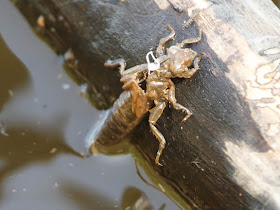
Many people are unaware of the fact that dragonflies spend the majority of their life underwater. Like butterflies, dragonflies and damselflies have multiple stages of development, but instead of four stages like butterflies they only have three stages of development or what is called an incomplete
metamorphosis. Unlike butterflies dragonflies do not go through a pupal state, instead they go directly from their larval state, called a nymph, to their adult stage which is a dragonfly.

Dragonflies typically live from one to three years in their larval form, although some species live longer and others less. The nymphs hatch from the eggs which are deposited into the water by the female. The nymphs are
carnivorous eating
aquatic insects, other nymphs, tadpole and small fish. They frequently molt as their size increases. When they are ready to become adults they go into a type of rest state called
diapause,where the final
necessary changes in their form are made. When the
diapause is complete the nymph will crawl out of the water, typically onto to a rock or hanging vertically from vegetation on the shoreline. Then a split occurs in the skin at the back of the head. The split continues down the back making enough room for the new dragonfly to emerge. The picture above are the skin husk that remains after the dragonfly emerges. These appear to be the husk of emergent
clubtails which were photographed on the shore of the St
Croix River.
 Many people are unaware of the fact that dragonflies spend the majority of their life underwater. Like butterflies, dragonflies and damselflies have multiple stages of development, but instead of four stages like butterflies they only have three stages of development or what is called an incomplete metamorphosis. Unlike butterflies dragonflies do not go through a pupal state, instead they go directly from their larval state, called a nymph, to their adult stage which is a dragonfly.
Many people are unaware of the fact that dragonflies spend the majority of their life underwater. Like butterflies, dragonflies and damselflies have multiple stages of development, but instead of four stages like butterflies they only have three stages of development or what is called an incomplete metamorphosis. Unlike butterflies dragonflies do not go through a pupal state, instead they go directly from their larval state, called a nymph, to their adult stage which is a dragonfly. Dragonflies typically live from one to three years in their larval form, although some species live longer and others less. The nymphs hatch from the eggs which are deposited into the water by the female. The nymphs are carnivorous eating aquatic insects, other nymphs, tadpole and small fish. They frequently molt as their size increases. When they are ready to become adults they go into a type of rest state called diapause,where the final necessary changes in their form are made. When the diapause is complete the nymph will crawl out of the water, typically onto to a rock or hanging vertically from vegetation on the shoreline. Then a split occurs in the skin at the back of the head. The split continues down the back making enough room for the new dragonfly to emerge. The picture above are the skin husk that remains after the dragonfly emerges. These appear to be the husk of emergent clubtails which were photographed on the shore of the St Croix River.
Dragonflies typically live from one to three years in their larval form, although some species live longer and others less. The nymphs hatch from the eggs which are deposited into the water by the female. The nymphs are carnivorous eating aquatic insects, other nymphs, tadpole and small fish. They frequently molt as their size increases. When they are ready to become adults they go into a type of rest state called diapause,where the final necessary changes in their form are made. When the diapause is complete the nymph will crawl out of the water, typically onto to a rock or hanging vertically from vegetation on the shoreline. Then a split occurs in the skin at the back of the head. The split continues down the back making enough room for the new dragonfly to emerge. The picture above are the skin husk that remains after the dragonfly emerges. These appear to be the husk of emergent clubtails which were photographed on the shore of the St Croix River.

That's great information. We have lots of damsel flies at our cabin. They are a lovely blue and will even land on an outstretched foot while I am floating in our lake "swimming pool." I will be on the lookout for nymphs and their husks. - Margy
ReplyDeleteVery interesting...I had known this from posting a did last year, however, my grandson and daughter found a creature early last month and Thomas placed it in jar for a little while and then released it. It is in a post from back then as well I do believe. I am now thinking that it had been a dragonfly in this stage. Not only are your images great, I think I just learned what the mystery guest was~
ReplyDeleteSuperb observation and very nice shots of it!
ReplyDeleteThanks for sharing the scoop on dragonflies.
ReplyDeleteGreat shots. I'm going to use this information to make other people think I'm really smart. :-)
ReplyDeleteThanks for the info - you are right, many people (including me) do not know this stuff - so like Vicki above, I shall now impress many with my new nugget of info!!
ReplyDeleteThanks for posting this information. I stumbled across your post and I'm so glad I did! The other day my son asked me to come outside and check out this insect hanging vertically on our screen. I had no clue as to what it was. We just left it alone...wondering what it was. Now I know that it was a dragonfly in one of its stages. So cool to know this now. :)
ReplyDelete